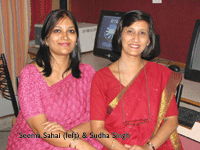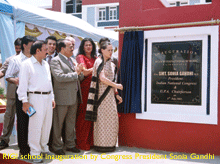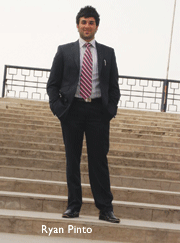From small beginnings 25 years ago, the Mumbai-based Ryan International Group of Institutions has expanded into India’s largest closely-held chain of primary-cum-secondary schools. On the eve of RIGI’s silver jubilee Dilip Thakore investigates the factors behind its continuous growth and expansion
.gif) For the Mumbai-based Ryan International group of Institutions (RIGI) — India’s largest privately promoted, closely-held chain of 110 primary-cum-secondary schools spread over 15 states of the Indian Union with an aggregate enrollment of 198,372 students — July 4, 2008 will be a landmark date in its history. It will mark the 25th anniversary of the day when its founder chairman Dr. Augustine Pinto promoted this nationwide education chain’s first kindergarten-class V primary school. Despite its imposing name, St. Xavier’s High School, promoted in Mumbai’s distant suburb of Borivali East, commenced classes on July 4, 1983 with a few dozen students.
For the Mumbai-based Ryan International group of Institutions (RIGI) — India’s largest privately promoted, closely-held chain of 110 primary-cum-secondary schools spread over 15 states of the Indian Union with an aggregate enrollment of 198,372 students — July 4, 2008 will be a landmark date in its history. It will mark the 25th anniversary of the day when its founder chairman Dr. Augustine Pinto promoted this nationwide education chain’s first kindergarten-class V primary school. Despite its imposing name, St. Xavier’s High School, promoted in Mumbai’s distant suburb of Borivali East, commenced classes on July 4, 1983 with a few dozen students.
Since then not only has St. Xavier’s morphed into a fully-fledged K-X primary-cum-secondary affiliated with the Maharashtra state government’s Secondary School Certificate (SSC) examinations board with 6,500 students, the number of primary-cum-secondaries (including 26 schools named St. Xavier’s) gathered under the RIGI umbrella brand has multiplied to 110 institutions with an aggregate enrollment of almost 200,000 students across the country. Although when compared with schools promoted and owned by the state governments and the Central government (which owns and manages the 931 well-reputed Kendriya Vidyalaya and 540 Jawahar Navodaya schools countrywide) as also in comparison with the well-known DPS (Delhi Public School) and DAV (Dayanand Anglo Vedic) school chains, the Ryan International Group with its complement of 110 primary-cum secondaries is relatively small, the distinguishing characteristic of RIGI is that it is a closely-held group of institutions promoted by several trusts and societies constituted and registered by Dr. Augustine Pinto (chairman) and his wife Grace (managing director.
Moreover given that the DPS and DAV schools are run by hundreds of franchisees rather than a central command, it is arguable that RIGI is India’s largest private sector schools chain which employs a massive army of approximately 10,000 teaching and non-teaching staff, generates an annual estimated revenue of Rs.40 crore, and is perhaps the country’s largest private sector purchaser of laboratories, library and textbooks, blackboards, smartboards, desks, tables and chairs and school stationery. Little wonder RIGI’s top management is insulated from businessmen, salesmen and the public by a phalanx of professional aides and advisors.
Yet the massive direct and indirect employment generated by the rapid growth of RIGI from humble beginnings in 1983 to a 110-strong — and expanding — chain of schools apart, the great, unacknowledged contribution of Indian secondary education’s first family is that it has brought highly-prized, quality English medium ‘convent’ school education within easy reach of the country’s rapidly expanding and highly aspirational middle class. Thus far in the quarter century of its operations, RIGI has injected 125,000 well-educated school leavers (classes X and XII) into the bloodstream of the economy and/or into institutions of higher education in India and abroad.
Twenty-five years ago, God planted a seed in my heart and directed me to spread affordable, high quality English medium education within Indian society. I heeded His call with full commitment and His hand has been guiding me in my mission to bring quality, useful education to all who need it. Since then it has always been our credo in RIGI to let our work rather than our words, speak for us,” says Dr. Pinto who over the past quarter century has engineered the growth and development of RIGI into one of the most popular brands in Indian school education enjoying sustained support from middle class parent communities who stampede to enroll their children as soon as a new RIGI school invites admissions.
And given the tortuous path which led Dr. Pinto — one of the nine children born to a modest farmer in Mangalore district in north Karnataka who studied at St. Aloysius High School, Mangalore and Loyola College, Chennai, from where he graduated in 1969 with a degree in economics — to Mumbai, where he began his career as an administrative clerk in a plastic footwear company, and into education lends credence to his claim of divine inspiration and guidance. Yet like the prophet Job, this devout youth was tested by God to be steeled for his mission. Two years into his new job, Pinto was retrenched when the company (Bharat Swiss Plastics) went into liquidation. But fortuitously a friend in Mumbai University put in a word for him to land a job as a temporary primary teacher at a newly promoted school in Malad, then a quasi-rural suburb of Mumbai. “While at this school I developed an affinity for teaching children. Moreover I was also inspired by the dedication and commitment of Mrs. Sequeira, principal of the school who went from house to house in a bullock cart to persuade parents to send children to her school which she started in single room with a first batch of 12 students. It then occurred to me that if this frail old lady could have built up a fully-fledged school from scratch, so could I,” recalls Pinto.
Indeed at the time Pinto discovered that he not only liked teaching, but teachers as well. In 1974 he met and married Grace Albuquerque, a maths and science teacher. The guiding divine hand engineered a strong and mutually supportive partnership which is a prime factor in the dramatic growth and development of India’s largest chain of closely-held private sector schools.
RIGI scale profile
|
|
|
|
State
|
No. of institutions
|
Student strength
|
Staff (teaching &non-teaching)
|
Maharashtra
|
66
|
122,180
|
6,083
|
Gujarat
|
8
|
14,519
|
711
|
Karnataka
|
3
|
6,693
|
328
|
Punjab
|
3
|
5,772
|
276
|
Rajasthan
|
3
|
3,308
|
163
|
Haryana
|
2
|
7,929
|
391
|
Uttar Pradesh
|
4
|
9,235
|
446
|
Pondicherry
|
1
|
172
|
10
|
Tamil Nadu
|
Under construction
|
__
|
__
|
| Madhya Pradesh |
5
|
4,338
|
211
|
Chattisgarh
|
7
|
4,877
|
243
|
Chandigarh
|
1
|
3,905
|
191
|
Delhi
|
7
|
15,44
|
736
|
Goa
|
Under construction
|
__
|
__
|
West Bengal
|
Under construction
|
__
|
__
|
| Total |
110 |
198,372 |
9,789 |
Yet before he started his first school, the good Lord tested Pinto further. A Fr. Agnelo Primary School he established in 1976 with a capital investment of Rs.10,000 failed. With a growing family to support after the birth that year of his daughter Snehal, although keen on providing foundational primary education his own way, this now fully committed teacher was obliged to accept a teaching job with the St. Francis School in Malad. Seven years later, on July 4, 1983, he promoted St. Xavier’s High in Borivali East with a modest capital investment. This K-X state board affiliated school, which currently has an aggregate enrollment of 6,500 K-X students, became the foundation block of the countrywide Ryan Group of education institutions. Since then the rapidly multiplying number of RIGI schools have won widespread public support and affirmation for bringing high quality English medium school education within reach of India’s new middle class which has been rapidly expanding since the mid 1980s when the country’s young prime minister Rajiv Gandhi began the process of liberalising and deregulating the Indian economy with a special focus on contemporising Indian education.
Looking back over the past quarter century, Dr. Pinto recalls that even before fully commissioning St. Xavier’s High in suburban Mumbai, he had made up his mind to promote a chain of schools rather than to remain entirely focused on his first institution.
“By then following my involvement with the promotion of several primary and secondary schools, I was fully aware of the massive pent-up demand for good quality English medium education in the fast expanding suburbs of Mumbai. With land prices in south Mumbai rising continu-ously, I was very conscious that the city’s new middle class would move to the suburbs and that the centre of gravity of the city itself was moving north. I believed — as I still do — that I had a social obligation to provide high quality primary and secondary education for this new middle class which would drive the country’s growth and development. Therefore right from the start of my entry into school education I was determined to expand the scale of operations by continuously promoting new institutions,” he recalls.
Although Dr. Pinto doesn’t like to elaborate, promoting new schools in Mumbai — where licence-permit raj was steadily migrating from industry into education (where it is still flourishing) — required great reserves of patience and tenacity to persuade indifferent education depart-ment and municipal officials to clear greenfield schools in the city’s fast filling suburbs. To this end the young edupreneur learned to develop contacts and influence in political parties whose leaders were always keen to establish high quality schools in their constituencies to win electoral support.
“The secret of RIGI’s success is that within a short time we built a reputation for delivering high-quality, holistic English medium education at affordable prices. We made it policy to respond to requests from parents, society and leaders from academically under-served areas to establish schools for their benefit. This enabled us to purchase inexpensive real estate in under-developed areas with community support. And thirdly, over the years we have developed speedy project execution capability within RIGI which enables us to get our schools up and running in quick time. Consequently when we established our first school beyond Mumbai in Nasik in 1985, the public response was overwhelming enabling us to enroll 700 students within 15 days and 1,800 in Raipur within 30 days. Similarly in 1991 when we were allotted land by the Delhi Development Authority to promote a school in Vasant Kunj (south Delhi), we constructed a 36 room temporary structure within 40 days to start classes even as the school was being built. As a result of our demonstrated capability to get new school projects off to quick starts, banks and lending institutions came forward to help our growth,” explains Pinto who was appointed sheriff of Mumbai in 200.
This public demand-led growth and development formula seems to have worked remarkably well for RIGI. Currently the group has established 66 primary-cum secondary schools in Maharashtra with an aggregate enrollment of 122,180 students; seven in Delhi (15,444); three in Karnataka (6,693); eight in Gujarat (14,519), apart from schools in Punjab, Haryana, and Uttar Pradesh among other states of the Indian Union (see table). As a consequence, today Ryan International is a well-known and respected brand in secondary education with several of its primary-cum-secondaries ranked among the country’s top day schools (RIGI hasn’t ventured into boarding schools in a big way.
.gif) This assessment was confirmed by the first-of-its-kind pan-India survey of the country’s most respected schools conducted by this publication in August last year (2007). In the IMRB-EducationWorld ranking of the country’s top 250 schools Ryan International, Goregaon was ranked 16th overall and first in Mumbai and Maharashtra (pop. 98 million), India’s most industrialised state. Moreover despite being a relatively newly established institution (1991) Ryan International, Vasant Kunj (Delhi) was ranked 15th among all days schools countrywide in this pioneer assessment and ranking survey. Dr. Grace Pinto, co-promoter and managing director of RIGI also attributes the rapid growth and multiplication of the Ryan International group to divine inspiration but in addition pays tribute to her husband’s missionary zeal and commitment to the cause of affordable education for all as a causative factor behind the speedy emergence of RIGI as the country’s largest closely-held schools chain. “It’s God’s blessing and the vision, passion and sheer commitment of our chairman Dr. Augustine Pinto which has inspired all of us in RIGI to spread education across the country. The mission to provide affordable high quality education to people all over the country articulated by him has been our driving force. Moreover the continuous support of our teachers, students and parents has also been instrumental in our success,” says Grace Pinto.
This assessment was confirmed by the first-of-its-kind pan-India survey of the country’s most respected schools conducted by this publication in August last year (2007). In the IMRB-EducationWorld ranking of the country’s top 250 schools Ryan International, Goregaon was ranked 16th overall and first in Mumbai and Maharashtra (pop. 98 million), India’s most industrialised state. Moreover despite being a relatively newly established institution (1991) Ryan International, Vasant Kunj (Delhi) was ranked 15th among all days schools countrywide in this pioneer assessment and ranking survey. Dr. Grace Pinto, co-promoter and managing director of RIGI also attributes the rapid growth and multiplication of the Ryan International group to divine inspiration but in addition pays tribute to her husband’s missionary zeal and commitment to the cause of affordable education for all as a causative factor behind the speedy emergence of RIGI as the country’s largest closely-held schools chain. “It’s God’s blessing and the vision, passion and sheer commitment of our chairman Dr. Augustine Pinto which has inspired all of us in RIGI to spread education across the country. The mission to provide affordable high quality education to people all over the country articulated by him has been our driving force. Moreover the continuous support of our teachers, students and parents has also been instrumental in our success,” says Grace Pinto.
And if 25 years on, RIGI is accelerating its pace of growth and expansion into new territories in India and abroad, the unrelenting commitment to provide quality English medium education at mid-market prices is the prime factor, says Grace. “In Ryan Group schools our focus is on creating enabling environments for teachers to provide high quality education by continuously introducing teaching innovations and upgrading existing pedagogies. We pride ourselves for providing in-depth attention to children for the complete development of their potential. Therefore our objective is to nurture children not only to excel academically, but beyond academics to become worldly-wise, smart citizens. This is the distinguishing characteristic of RIGI education,” explains Grace Pinto.
But while values-driven (God and biblical injunctions are omnipresent in RIGI schools) high-quality English medium education supplemented with strong co-curricular and extra-curricular components and dispensed at affordable prices by RIGI across its 110 schools countrywide, is undoubtedly a major factor behind the growth of the group into the country’s biggest chain of closely-held schools, the secular secret of its success is the application of best corporate management practices to the administration of its education institutions. Unlike most academic institutions which tend to be indifferent, if not averse, to the corporate and external world beyond school gates, the RIGI top management is highly receptive and quick to implement tried and tested business management practices.
 “There is unusual awareness within the top management of RIGI that schools are people driven institutions and that they are as good as their teachers. Therefore all our management systems are people oriented with great emphasis accorded to personnel management and teacher development. Every teacher in the Ryan Group is given constant in-service training which aggregates to four-five weeks per year. For instance recently we enrolled 115 RIGI teachers for the Wide World Harvard Graduate School of Education’s online multiple intelligences development programme spread over 12 weeks. The top management of RIGI is very good at people management and highly values competent professionals. This explains the low attrition and average eight-ten year tenure of our teachers,” says Francis Joseph, a commerce and business management alumnus of Mumbai and Kuwait universities who first served with RIGI in 1992-2000, accepted a top-level position as HRD manager of Kharafi International (2000-2006), Kuwait (UAE) and returned to RIGI where he manages the HRD and OD (organisational development) portfolios.
“There is unusual awareness within the top management of RIGI that schools are people driven institutions and that they are as good as their teachers. Therefore all our management systems are people oriented with great emphasis accorded to personnel management and teacher development. Every teacher in the Ryan Group is given constant in-service training which aggregates to four-five weeks per year. For instance recently we enrolled 115 RIGI teachers for the Wide World Harvard Graduate School of Education’s online multiple intelligences development programme spread over 12 weeks. The top management of RIGI is very good at people management and highly values competent professionals. This explains the low attrition and average eight-ten year tenure of our teachers,” says Francis Joseph, a commerce and business management alumnus of Mumbai and Kuwait universities who first served with RIGI in 1992-2000, accepted a top-level position as HRD manager of Kharafi International (2000-2006), Kuwait (UAE) and returned to RIGI where he manages the HRD and OD (organisational development) portfolios.
Although RIGI is an unapologetically closely-held and privately managed chain of primary-cum-secondaries in which the promoters are accorded exalted status, there’s no doubt that principals and teachers of constituent schools are highly valued and respected. With the growing number of high-end schools springing up across the country experiencing severe teacher and principal shortages, there’s acute awareness within RIGI of the importance of recruiting, developing and retaining faculty. “There’s extraordinary camaraderie and bonding within the teachers’ community of RIGI. Teachers are given continuous in-service training opportunities to develop their skills and since we have schools all over the country, job transfers are easily accommodated when necessary. As a consequence there is job security, career stability and a sense of belonging within the Ryan Group of schools,” says Seema Sahai a history alumna of Delhi’s Lady Shri Ram College and former lecturer at Delhi University who signed up with RIGI in 1998 and is currently principal of the CBSE-affiliated K-XII Ryan International School, Ghaziabad (estb.1992) which has an enrollment of 2,000 plus students.
 The “sense of belonging” to a respected group of schools operating countrywide is also highlighted by Sudha Singh, a chemistry postgraduate of Sagar University, Madhya Pradesh who came aboard RIGI in 1994 and is currently principal of the CBSE-affiliated Ryan International, Greater Noida (Uttar Pradesh), a newer showpiece K-XII school (estb. 2001) with 2,400 students including 88 boarders on its muster roll. “Principals of RIGI schools enjoy a great deal of operational independence. We draw up our own annual budgets within broad guidelines issued by the corporate office and have considerable latitude in incurring approved expenditure. Moreover we are encouraged to innovate administrative and learning systems and share our experiences and best practices with other RIGI schools through our education portal ryanconnect.org. Principals, teachers and students enjoy stimulating and enabling academic and co-curricular environments in the Ryan Group of schools. That’s the secret of our success,” says Sudha Singh.
The “sense of belonging” to a respected group of schools operating countrywide is also highlighted by Sudha Singh, a chemistry postgraduate of Sagar University, Madhya Pradesh who came aboard RIGI in 1994 and is currently principal of the CBSE-affiliated Ryan International, Greater Noida (Uttar Pradesh), a newer showpiece K-XII school (estb. 2001) with 2,400 students including 88 boarders on its muster roll. “Principals of RIGI schools enjoy a great deal of operational independence. We draw up our own annual budgets within broad guidelines issued by the corporate office and have considerable latitude in incurring approved expenditure. Moreover we are encouraged to innovate administrative and learning systems and share our experiences and best practices with other RIGI schools through our education portal ryanconnect.org. Principals, teachers and students enjoy stimulating and enabling academic and co-curricular environments in the Ryan Group of schools. That’s the secret of our success,” says Sudha Singh.
Moreover the RIGI management’s strong emphasis on co-curricular education — music, dance, theatre, elocution, art and crafts etc — is a strong attraction for aspirational middle class parents put off by the bleak cram school environments of conventional mid-priced English medium schools. And the RIGI top management’s commitment to intensive co-curricular education is genuine. Every year the Ryan Group stages an international children’s festival of performing arts (ICFPA) and a Indian Model United Nations conference (INMUN) which attract students from across India and abroad.
Yet, well developed institutional management and holistic education provision skills apart, with neta-babu licence-permit-quota raj having migrated from Indian industry to education with a vengeance, the rapid growth and expansion of the Ryan Group would not have been possible without the political environment management skills of Augustine and Grace Pinto. According to RIGI sources, the top management maintains “well-balanced relations” with all political parties and has access to most political leaders. This is mutually beneficial because politicians are keen to invite RIGI to establish high quality and modestly priced English medium schools in their constituencies to win public support and approval.
 “RIGI is flooded with invitations from state and local governments and politicians across the country who are aware that we are flexible about board affiliation and calibrating our fees to suit local needs,” says a RIGI spokesperson. Among the high-profile constituencies boasting RIGI schools are Rae Bareilly, Uttar Pradesh, represented in Parliament by Congress party chairperson Sonia Gandhi, and Bolpur, the parliamentary constituency of Somnath Chatterjee, speaker of the Lok Sabha and a Communist Party (Marxist) leader.
“RIGI is flooded with invitations from state and local governments and politicians across the country who are aware that we are flexible about board affiliation and calibrating our fees to suit local needs,” says a RIGI spokesperson. Among the high-profile constituencies boasting RIGI schools are Rae Bareilly, Uttar Pradesh, represented in Parliament by Congress party chairperson Sonia Gandhi, and Bolpur, the parliamentary constituency of Somnath Chatterjee, speaker of the Lok Sabha and a Communist Party (Marxist) leader.
Moreover some enlightened corporates have begun to invite the RIGI management to establish schools near their factories to provide quality English medium education to their employees’ children. Recently at the invitation of DCM Shriram Consolidated Ltd, RIGI inaugurated a new K-X school in Shahajahanpur (Uttar Pradesh) which attracted an enrollment of over 1,000 students in record time.
Little wonder knowledgeable monitors of the primary-secondary education scenario are impressed with the RIGI business model. “The defining characteristic of the RIGI growth and development model is its flexibility. The group’s management is not wedded to any examination board, pricing model or construction norm. All RIGI schools are custom-built to suit their local environments. Their commonality is high-quality, values-driven English medium education. That’s the secret of their success,” says Francis Fanthome, MP and former secretary general of the Delhi-based Council for Indian School Certificate Examinations.
 Now with the RIGI chain having expanded to 110 schools in India and eight primary-cum-secondaries under construction in three states, inevitably the first family of Indian secondary education has drawn up ambitious plans to live up to its name by introducing international curriculums such as the International Baccalaureate of IBO, Geneva and of the UK-based Cambridge International Examinations into its schools in India. Moreover responding to invitations from Indian communities abroad, the Ryan management is drawing up plans to establish CBSE-affiliated primary-cum-secondary schools in Qatar and Sharjah and is also negotiating joint ventures in Canada and the US. To this end RIGI has already established representative offices in Dubai, Miami (USA) and Vancouver (Canada) with offices in Melbourne, London and Moscow scheduled to be inaugurated shortly.
Now with the RIGI chain having expanded to 110 schools in India and eight primary-cum-secondaries under construction in three states, inevitably the first family of Indian secondary education has drawn up ambitious plans to live up to its name by introducing international curriculums such as the International Baccalaureate of IBO, Geneva and of the UK-based Cambridge International Examinations into its schools in India. Moreover responding to invitations from Indian communities abroad, the Ryan management is drawing up plans to establish CBSE-affiliated primary-cum-secondary schools in Qatar and Sharjah and is also negotiating joint ventures in Canada and the US. To this end RIGI has already established representative offices in Dubai, Miami (USA) and Vancouver (Canada) with offices in Melbourne, London and Moscow scheduled to be inaugurated shortly.
“The initiative to expand operations to countries with sizeable communities of people from the subcontinent is an excellent idea because it will enable children of Indian origin living abroad to receive international education with Indian cultural content. It will also facilitate bringing in international curriculums which can be adapted and spread through the Ryan Group’s schools in India. This will make high-quality internationally benchmarked education available to students in all RIGI schools in the near future,” says Tammy Hoskins, an alumna of the George Washington University, University of South Florida and National-Louis University, Chicago, currently a professional curriculums designer and author of several teacher training manuals who recently (March) signed up with RIGI as head of international curriculums.
With a quarter century of continuous growth and expansion behind it and having earned the gratitude and goodwill of middle class communities (for provision of high quality English medium education at mid-market prices) and of the country’s all powerful political class cutting across all parties (for ready willingness to establish RIGI schools in diverse far-flung constituencies), it’s hardly surprising that on the eve of the Ryan Group’s silver jubilee the dominant mood in RIGI’s corporate office in Borivali, Mumbai is of quiet optimism.
 “The prime motivational factor which has driven the growth of RIGI is not revenue and profitability concerns but the desire to provide our brand of values-based education to as many children in the country as possible. In our family it is our belief that we have been given enough love and financial security by God and that it is our duty and responsibility to pass it on. In most of our schools between 5-50 percent of children are studying on scholarships and freeships and our expansion plans are driven by the need to reach as many children as possible in the country’s educationally under-served areas,” says Ryan Pinto (22), an alumnus of Hebron School, Ooty and Warwick University (UK) and the mature and focused chief executive and heir apparent of RIGI.
“The prime motivational factor which has driven the growth of RIGI is not revenue and profitability concerns but the desire to provide our brand of values-based education to as many children in the country as possible. In our family it is our belief that we have been given enough love and financial security by God and that it is our duty and responsibility to pass it on. In most of our schools between 5-50 percent of children are studying on scholarships and freeships and our expansion plans are driven by the need to reach as many children as possible in the country’s educationally under-served areas,” says Ryan Pinto (22), an alumnus of Hebron School, Ooty and Warwick University (UK) and the mature and focused chief executive and heir apparent of RIGI.
Twenty-five years on, Ryan Pinto believes that RIGI is sufficiently experienced and equipped to diversify into higher education and live up to its name by going truly international. RIGI’s first foray into higher education — an engineering college with a capacity to accommodate 5,000 students in 2010 is under construction in Chennai. Moreover joint venture English medium primary-cum-secondary schools (with management vested in RIGI) are proposed to be established with local partners in the Maldives, Thailand, China, Japan and the United States.
"The Central and state governments in India as well as governments in neighbouring countries are responding to public pressure for affordably priced English medium education adapted to local conditions for which RIGI has acquired a good reputation. We believe our students who have had a memorable holistic education experience in RIGI want us to enter higher education. And we are merely following our tradition of responding to public demand by venturing beyond national boundaries,” says Ryan Pinto.
As long waiting lists and annual summer stampedes for admission into English medium schools across the country testify, the demand for quality primary-secondary education is far ahead of supply — an on-the-ground reality acknowledged by all except ivory tower educrats rationing licences and permits in New Delhi and state capitals. Against this backdrop, it’s hardly surprising that demand for the high-quality, affordably priced education adapted to local conditions offered by RIGI is rising continuously. Education experts and skeptics tend to express the opinion that the closely-held RIGI cannot sustain its current rate of growth. They were proved wrong in the past and are likely to be proved wrong again .